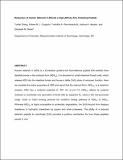Reduction of Human Defensin 5 Affords a High-Affinity Zinc-Chelating Peptide
Author(s)
Zhang, Yunfei; Cougnon, Fabien; Wanniarachchi, Yoshitha A.; Hayden, Joshua A.; Nolan, Elizabeth M.
Downloadarticle (14.19Mb)
OPEN_ACCESS_POLICY
Open Access Policy
Creative Commons Attribution-Noncommercial-Share Alike
Terms of use
Metadata
Show full item recordAbstract
Human defensin 5 (HD5) is a 32-residue cysteine-rich host-defense peptide that exhibits three disulfide bonds in the oxidized form (HD5[subscript ox]). It is abundant in small intestinal Paneth cells, which release HD5 into the intestinal lumen and house a labile Zn(II) store of unknown function. Here, we consider the redox properties of HD5 and report that the reduced form, HD5[subscript red], is a metal-ion chelator. HD5 has a midpoint potential of −257 mV at pH 7.0. HD5[subscript red] utilizes its cysteine residues to coordinate one equivalent of Zn(II) with an apparent K[subscript d1] value in the midpicomolar range. Zn(II) or Cd(II) binding perturbs the oxidative folding pathway of HD5[subscript red] to HD5[subscript ox]. Whereas HD5[subscript red] is highly susceptible to proteolytic degradation, the Zn(II)-bound form displays resistance to hydrolytic breakdown by trypsin and other proteases. The ability of a reduced defensin peptide to coordinate Zn(II) provides a putative mechanism for how these peptides persist in vivo.
Date issued
2013-07Department
Massachusetts Institute of Technology. Department of ChemistryJournal
ACS Chemical Biology
Publisher
American Chemical Society (ACS)
Citation
Zhang, Yunfei, Fabien Cougnon, Yoshitha A. Wanniarachchi, Joshua A. Hayden, and Elizabeth M. Nolan. "Reduction of Human Defensin 5 Affords a High-Affinity Zinc-Chelating Peptide." ACS Chem. Biol., 2013, 8 (9), pp 1907–1911
Version: Author's final manuscript
ISSN
1554-8929
1554-8937